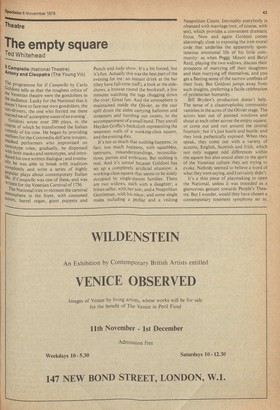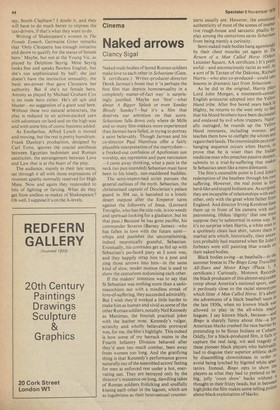Theatre The empty square
Ted Whitehead
II Campiello (National Theatre) Antony and Cleopatra (The Young Vic)
The programme for II Campiello by Carlo Goldoni tells us that the toughest critics of the Venetian theatre were the gondoliers in the audience. Lucky for the National that it doesn't have to face our own gondoliers, the tam-drivers; the one who ferried me there warned me of 'a complete waste of an evening'. Goldoni wrote over 200 plays, in the course of which he transformed the Italian colnedy of his time. He began by providing outlines for the Commedia dell'arte troupes, Masked performers who improvised on stereotype roles; gradually, he dispensed with both masks and stereotypes, and introduced his own written dialogue; and eventuallY he was able to break with tradition completely and write a series of highly 131,11ar plays about contemporary Italian Ire. jj Campiello was one of these, and was written for the Venetian Carnival of 1756. The National tries to recreate the carnival atmosphere in the foyer, with costumed actors, barrel organ, giant puppets and
Punch and Judy show. It's a bit forced, but it's fun. Actually this was the best part of the evening for me: an instant drink at the bar (they have full-time staff), a look at the sideshows, a browse round the bookstall, a few minutes watching the tugs chugging down the river. Great fun. And the atmosphere is maintained inside the Olivier, as the cast spill down the aisles carrying balloons and streamers and handing out sweets, to the accompaniment of a small band. They unroll Hayden Griffin's backcloth representing the tenement walls of a working-class square, and the evening dies.
It's not so much that nothing happens; in fact, too much happens, with squabbles, tantrums, misunderstandings, reconciliadons, parties and embraces. But nothing is real. And it's unreal because Goldoni has set up a completely artificial situation : a working-class square that seems to be solely occupied by single-parent families. There are two widows, each with a daughter; a fritter-seller, with her son; and a Neapolitan Gentleman, with his niece; and some single males including a Pedlar and a visiting
Neapolitan Count. Inevitably everybody is obsessed with marriage (not, of course, with sex), which provides a convenient dramatic focus. Now and again Goldoni comes alarmingly close to exposing the iron moral code that underlies the apparently spontaneous emotional life of his little community: as when Peggy Mount and Beryl Reid, playing the two widows, discuss their prospects of marrying off their daughters and then marrying off themselves, and you get a fleeting sense of the narrow confines of their lives. But Goldoni jumps away from such insights, preferring a facile celebration of proletarian humanity.
Bill Bryden's production doesn't help. The sense of a claustrophobic community vanishes in the acres of the Olivier stage. The actors lean out of painted windows and shout at each other across the empty square, or come out and run around the central fountain ; but it's just hustle and bustle, and they look pathetically exposed. When they speak, they come out with a variety of accents, English, Scottish and Irish, which not only suggest odd differences within the square but also sound alien to the spirit of the Venetian culture they are trying to evoke. Nobody seemed to believe a word of what they were saying, and [certainly didn't.
It's a thin piece of playmaking to open the National, unless it was intended as a glamorous gesture towards People's Theatre. But [ wonder, would they have chosen a contemporary tenement symphony set in, say, South Clapham ? I doubt it, and they will have to do much better to impress the taxi-drivers, if that's what they want to do.
Writing of Shakespeare's women in The Female Eunuch, Germaine Greer remarks that 'Only Cleopatra has enough initiative and desire to qualify for the status of female hero.' Maybe, but not at the Young Vic, as played by Delphine Seyrig. Mme Seyrig looks fine and speaks flawless English, but she's too sophisticated by half; she just doesn't have the instinctive sensuality, the basic sex-power that gave Cleopatra her authority. But if she's no female hero, Antony as played by Michael Graham Cox is no male hero either. He's all spit and bluster—no suggestion of a giant soul here. Without these two natural aristocrats, the play is reduced to an action-packed yarn with adventure on land and on the high seas and with some bits of comic business added.
As Enobarbus, Alfred Lynch is moved and moving, but the rest is pretty humdrum. Frank Dunlop's production, designed by Carl Toms, ignores the crucial antithesis between Egyptian hedonism and Roman asceticism, the estrangement between Love and Law that is at the heart of the play.
The audience, mainly in their late teens, sat through it all with those expressions of reverent apathy normally reserved for High Mass. Now and again they responded to bits of fighting or farcing. What do they get from endless re-makes of Shakespeare? Oh well, I suppose it's on the A-levels.



















































 Previous page
Previous page